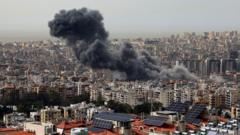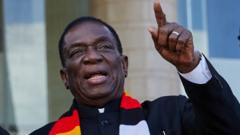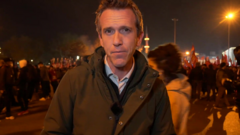The approval of a significant budget by Israel's Parliament grants Prime Minister Netanyahu more control over government priorities and appears to prolong the conflict in Gaza.
# Israel's Budget Approval: A Boost for Netanyahu Amid Ongoing Conflict

# Israel's Budget Approval: A Boost for Netanyahu Amid Ongoing Conflict
Israeli Parliament's recent budget approval reinforces Prime Minister Netanyahu's political standing while increasing military funding amidst Gaza hostilities.
Israel’s Parliament has made a critical move by approving a $206 billion budget, providing Prime Minister Benjamin Netanyahu with a considerable political triumph at a time of escalating tensions in the Gaza Strip. On Tuesday, the budget was passed with a vote of 66 in favor and 52 against, effectively consolidating Netanyahu's authority following extensive public unrest over ongoing Israeli hostages, robust political opposition, and various legal challenges that have plagued his administration.
This newly approved budget not only has substantial political ramifications but also reflects a long-term commitment to military expenditure, signaling that Israel is preparing for an extended conflict. Had the budget been rejected, it would have led to the automatic dissolution of Parliament, triggering early elections that could have jeopardized Netanyahu's coalition of right-wing parties.
Now, Netanyahu faces the opportunity to shape his government's agenda with greater flexibility, giving him the power to choose between furthering right-wing populist strategies and engaging in potential negotiations towards normalization with Saudi Arabia. Analysts suggest that his decisions will stem more from his personal strategies than from pressures exerted by coalition partners.
The vote was met with significant protests, as demonstrators blocked access to Parliament, demanding urgency from Netanyahu in negotiating the release of numerous hostages held in Gaza for nearly a year and a half. Negotiations with Hamas regarding a cease-fire seem to be stalled, raising widespread concerns among Israelis regarding the continued military actions and the fate of hostages yet to be freed.
This newly approved budget not only has substantial political ramifications but also reflects a long-term commitment to military expenditure, signaling that Israel is preparing for an extended conflict. Had the budget been rejected, it would have led to the automatic dissolution of Parliament, triggering early elections that could have jeopardized Netanyahu's coalition of right-wing parties.
Now, Netanyahu faces the opportunity to shape his government's agenda with greater flexibility, giving him the power to choose between furthering right-wing populist strategies and engaging in potential negotiations towards normalization with Saudi Arabia. Analysts suggest that his decisions will stem more from his personal strategies than from pressures exerted by coalition partners.
The vote was met with significant protests, as demonstrators blocked access to Parliament, demanding urgency from Netanyahu in negotiating the release of numerous hostages held in Gaza for nearly a year and a half. Negotiations with Hamas regarding a cease-fire seem to be stalled, raising widespread concerns among Israelis regarding the continued military actions and the fate of hostages yet to be freed.




















